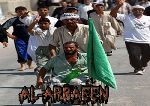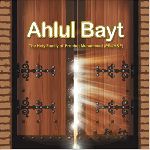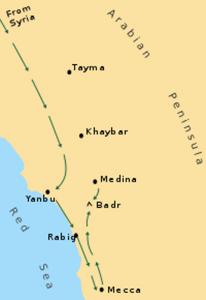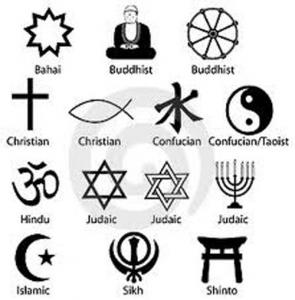Various Articles
Karbala': An Enduring Paradigm of Islamic Revivalism
- Published at
-
- Author:
- Sayyid Wahid Akhtar
- Source:
- Vol XIII No. 1 (Spring 1996)

The martyrdom of Imam Husayn ibn 'Ali ('a) and his companions in Karbala' proved to be the beginning of the downfall of the Banu Umayyah dynasty which had usurped the Islamic khilafah by deceit, repression, and corruption of the Muslim community.
Every day is Ashura and every land is Karbala
- Published at
-
- Author:
- Imam Reza Network
 This site is dedicated to Hussain ibn Ali (A), the Grandson of the Prophet (S),and his sacrifice for Islam at Kerbala.
This site is dedicated to Hussain ibn Ali (A), the Grandson of the Prophet (S),and his sacrifice for Islam at Kerbala.
A Talk between Hajjaj and a Fasting Shepherd
- Published at
-
- Author:
- Sayyid Abdul Husayn Dastaghaib Shirazi
 They say: Once Hajjaj bin Yusuf Thaqafi was on a journey to Yemen to rule from there. He had all the royal facilities with him. Wherever he camped, his servants erected tents and his cooks got busy in preparing royal dishes. At one of such halts, the climate was very hot. Arrangements were made for cooling and ventilation and they spread the dinner-cloth and put various kinds of food and sweets. As he was about to begin, his eye fell on a shepherd busy grazing his two or three sheep in a terribly hot atmosphere.
They say: Once Hajjaj bin Yusuf Thaqafi was on a journey to Yemen to rule from there. He had all the royal facilities with him. Wherever he camped, his servants erected tents and his cooks got busy in preparing royal dishes. At one of such halts, the climate was very hot. Arrangements were made for cooling and ventilation and they spread the dinner-cloth and put various kinds of food and sweets. As he was about to begin, his eye fell on a shepherd busy grazing his two or three sheep in a terribly hot atmosphere.
25th Zilqada: Dahwul Ardh
- Published at
-
- Source:
- www.duas.org
 Dahwul Ardh - the 25th of Dhulqa'dah, according to a tradition of the Holy Prophet (s) reported by one of his Sahabi - 'Abdullah bin Mas'ud , is the day when the earth was spread for the advantage of human beings. The phrase Dahwul Ardh literally means The spread of the earth. In another tradition it is reported that the first Rahmah & blessing descended on this very day.
Dahwul Ardh - the 25th of Dhulqa'dah, according to a tradition of the Holy Prophet (s) reported by one of his Sahabi - 'Abdullah bin Mas'ud , is the day when the earth was spread for the advantage of human beings. The phrase Dahwul Ardh literally means The spread of the earth. In another tradition it is reported that the first Rahmah & blessing descended on this very day.
The Holy Shrines of Ahlul Bayt (A.S.) in Iran
- Published at
-
- Author:
- Hamid Raza
 I hereby dedicate this small effort of mine to my great grandmother FATIMA BINTE IMAM MOOSA-E-KAZIM POPULARLY KNOWN AS KARIMA=E-AHLE-BAIT MASOOMA-E-QOM
I hereby dedicate this small effort of mine to my great grandmother FATIMA BINTE IMAM MOOSA-E-KAZIM POPULARLY KNOWN AS KARIMA=E-AHLE-BAIT MASOOMA-E-QOM
Badr: First Battle In Islam (624 A.D.)
- Published at
-
- Author:
- Yasin T. al- Jibouri
 Quraish had begun grand-scale preparations to attack Medina. The trade caravan which had gone to Syria that year headed by Abu Sufyan was extraordinarily equipped. Every Quraishite put all his savings in that caravan, and it was decided that the profit accrued that year would be given to the traders to spend on arms, horses, and other items of war to battle the Muslims of Medina.
Quraish had begun grand-scale preparations to attack Medina. The trade caravan which had gone to Syria that year headed by Abu Sufyan was extraordinarily equipped. Every Quraishite put all his savings in that caravan, and it was decided that the profit accrued that year would be given to the traders to spend on arms, horses, and other items of war to battle the Muslims of Medina.
Muslim-Christian Ties in Europe: Past, Present and Future
- Published at
-
- Author:
- Dr. Hans Koechler
- Source:
- www.islamonline.net
 From the universal perspective of the history of civilizations, Europe displays a remarkable disparity in regard to the mutual cultural influences of the Muslim and the Christian world.
From the universal perspective of the history of civilizations, Europe displays a remarkable disparity in regard to the mutual cultural influences of the Muslim and the Christian world.
Holy City of Qum: Past and Present
- Published at
-
- Author:
- Rasul Ja'fariyan
 A provincial capital since June 1996, Qum is a city 140 kilometers to the south of Tehran on the verge of the kavir, the vast desert of central Iran. Centuries before the arrival of Islam in the region, it was a major village among the many hamlets of the area. Several traditions and theories exist concerning the town's origin and name According to one of the more credible of them, its name derives from "kumeh," meaning a group of neighboring dwellings, which was changed to "Kum" before it came to be called "Qum" by the Arab settlers.
A provincial capital since June 1996, Qum is a city 140 kilometers to the south of Tehran on the verge of the kavir, the vast desert of central Iran. Centuries before the arrival of Islam in the region, it was a major village among the many hamlets of the area. Several traditions and theories exist concerning the town's origin and name According to one of the more credible of them, its name derives from "kumeh," meaning a group of neighboring dwellings, which was changed to "Kum" before it came to be called "Qum" by the Arab settlers.
Some Traits of Ashura Literature
- Published at
-
- Author:
- Shaykh Nasir Makarim Shirazi
 Ashura literature deals with oral and/or written discourses on, or related to, the Battle of Ashura of 10 Muharram 61 AH/ 10 October 680 AD. Ashura literature encompasses a wide array of materials, ranging from (chiefly Muharram and Safar) preachings, dirges (nawhas), and elegies (marthiyas) to ziarat-texts, salawats, books, treatises monographs, theses, dissertations, martyrdom accounts (maqtals), and biographies.
Ashura literature deals with oral and/or written discourses on, or related to, the Battle of Ashura of 10 Muharram 61 AH/ 10 October 680 AD. Ashura literature encompasses a wide array of materials, ranging from (chiefly Muharram and Safar) preachings, dirges (nawhas), and elegies (marthiyas) to ziarat-texts, salawats, books, treatises monographs, theses, dissertations, martyrdom accounts (maqtals), and biographies.
History of Kaaba: The House of Allah
- Published at
-
- Author:
- S.M.R. Shabbar
 In the province of Hejaz in the western part of Arabia, not far from the Red Sea, there lies the town of Makka. In the centre of this town there is a small square building made of stones, about 60 feet long, 60 feet wide and 60 feet high. Since time immemorial this town and this stone built house has been known to world travellers. This is Baitullah, the House of Allah. Its sanctity and antiquity is older than history itself.
In the province of Hejaz in the western part of Arabia, not far from the Red Sea, there lies the town of Makka. In the centre of this town there is a small square building made of stones, about 60 feet long, 60 feet wide and 60 feet high. Since time immemorial this town and this stone built house has been known to world travellers. This is Baitullah, the House of Allah. Its sanctity and antiquity is older than history itself.
Hadrat Ibrahim (A.S.), The Flag-Bearer of Tawhid
- Published at
-
- Author:
- Imam Reza Network
 Ibrahim a.s was brought and they enquired from him: Did you break these idols? He answered: The biggest among them broke them. If it could speak, then ask the idol itself. And Ibrahim a.s added you who worship these idols are tyrannical, I am not. And he said further: You worship these idols which gives neither benefit nor loss. Your faces had gone black, spittle upon you that you adore beside the God.
Ibrahim a.s was brought and they enquired from him: Did you break these idols? He answered: The biggest among them broke them. If it could speak, then ask the idol itself. And Ibrahim a.s added you who worship these idols are tyrannical, I am not. And he said further: You worship these idols which gives neither benefit nor loss. Your faces had gone black, spittle upon you that you adore beside the God.
Hazrat Zakaria (Zachariah) (Alaihis salam) and Hazrat Yahya (Alaihis salam)
- Published at
-
- Author:
- Imam Reza Network
 Imran bin Abdul Muttalib with Kuniya (a person’s surname given by the name of his or her son or daughter) of Abitalib. He was the father of Hazrat Ameeral momineen Ali (Alaihis Salam). Basically in noble Quran the name Imran means Hazrat Ali (Alaihis Salam). He was proved in Quran by heavenly revelation that was from the element and race of the prophet Muhammad sallallaho alaihe va ala alehi. The famous poets of Qureish in the city of Mecca had written innumerable books about this prestigious person as they heard very good compliments about him by the last prophet Muhammad sallallaho alaihe va ala alehi
Imran bin Abdul Muttalib with Kuniya (a person’s surname given by the name of his or her son or daughter) of Abitalib. He was the father of Hazrat Ameeral momineen Ali (Alaihis Salam). Basically in noble Quran the name Imran means Hazrat Ali (Alaihis Salam). He was proved in Quran by heavenly revelation that was from the element and race of the prophet Muhammad sallallaho alaihe va ala alehi. The famous poets of Qureish in the city of Mecca had written innumerable books about this prestigious person as they heard very good compliments about him by the last prophet Muhammad sallallaho alaihe va ala alehi
Jabir Ibn Haiyan: the Father of Chemistry
- Published at
 Jabir Ibn Haiyan, the alchemist Geber of the Middle Ages, is generally known as the father of chemistry. Abu Musa Jabir Ibn Hayyan, sometimes called al-Harrani and al-Sufi, was the son of the druggist (Attar). The precise date of his birth is the subject of some discussion, but it is established that he practiced medicine and alchemy in Kufa around 776 C.E.
Jabir Ibn Haiyan, the alchemist Geber of the Middle Ages, is generally known as the father of chemistry. Abu Musa Jabir Ibn Hayyan, sometimes called al-Harrani and al-Sufi, was the son of the druggist (Attar). The precise date of his birth is the subject of some discussion, but it is established that he practiced medicine and alchemy in Kufa around 776 C.E.
The History of Islamic Contemplation and Culture
- Published at
 The history of Islamic contemplation and culture has witnessed diverse conjunctions with different human knowledge especially the exotic reflections.
The history of Islamic contemplation and culture has witnessed diverse conjunctions with different human knowledge especially the exotic reflections.
The Battle of Ahzab (Khandaq/Trench)
- Published at
-
- Author:
- Imam Reza Network
 When the Jews of Bani Qaynqaa were expelled from Madina because of their trouble making, their sister tribe, the Bani Nuzayr, were very angry. They became deadly enemies of Islam and waited for an opportunity to do the Muslims harm.
When the Jews of Bani Qaynqaa were expelled from Madina because of their trouble making, their sister tribe, the Bani Nuzayr, were very angry. They became deadly enemies of Islam and waited for an opportunity to do the Muslims harm.
Battle of al-Ahzab (Tribes/ Khandaq/Ditch/ Moat/ Trench)
- Published at
-
- Author:
- www.islmaicoccasions.com
 The Qureshite community had one important dream: The destruction of Mohammed and his religion. Pagan tribes outside Mecca were sharing with them the same dream. Like the Meccans, these tribes considered Mohammed a serious menace to their religion.
The Qureshite community had one important dream: The destruction of Mohammed and his religion. Pagan tribes outside Mecca were sharing with them the same dream. Like the Meccans, these tribes considered Mohammed a serious menace to their religion.
Indian Muslims in the Age of Muslim Uprisings
- Published at
-
- Author:
- Muqtedar Khan
- Source:
- www.huffingtonpost.com
 Muslim lands and Muslim communities are in a state of violent and intense political transformations across the Muslim heartland. States are destabilized, national identities are being deconstructed, sectarian and ideological fault lines are getting exacerbated and radicalism, extremism and state oppression is escalating. In this ocean of despair, one finds the Indian Muslim community, an island of calm moderation. Its not a small island either, it is a pretty big chunk. Indian Muslims are about 180 million and constitute nearly 15 percent of the Indian population. If Indian Muslims of today were an independent country, they would be the fifth or sixth most populated country in the world.
Muslim lands and Muslim communities are in a state of violent and intense political transformations across the Muslim heartland. States are destabilized, national identities are being deconstructed, sectarian and ideological fault lines are getting exacerbated and radicalism, extremism and state oppression is escalating. In this ocean of despair, one finds the Indian Muslim community, an island of calm moderation. Its not a small island either, it is a pretty big chunk. Indian Muslims are about 180 million and constitute nearly 15 percent of the Indian population. If Indian Muslims of today were an independent country, they would be the fifth or sixth most populated country in the world.
Edward Said: Orientalism Revisited (25 years later)
- Published at
-
- Author:
- Edward Sadi
 Nine years ago I wrote an afterword for Orientalism which, in trying to clarify what I believed I had and had not said, stressed not only the many discussions that had opened up since my book appeared in 1978, but the ways in which a work about representations of "the orient" lent itself to increasing misinterpretation. That I find myself feeling more ironic than irritated about that very same thing today is a sign of how much my age has crept up on me. The recent deaths of my two main intellectual, political and personal mentors, the writers and activists Eqbal Ahmad and Ibrahim Abu-Lughod, has brought sadness and loss, as well as resignation and a certain stubborn will to go on.
Nine years ago I wrote an afterword for Orientalism which, in trying to clarify what I believed I had and had not said, stressed not only the many discussions that had opened up since my book appeared in 1978, but the ways in which a work about representations of "the orient" lent itself to increasing misinterpretation. That I find myself feeling more ironic than irritated about that very same thing today is a sign of how much my age has crept up on me. The recent deaths of my two main intellectual, political and personal mentors, the writers and activists Eqbal Ahmad and Ibrahim Abu-Lughod, has brought sadness and loss, as well as resignation and a certain stubborn will to go on.




